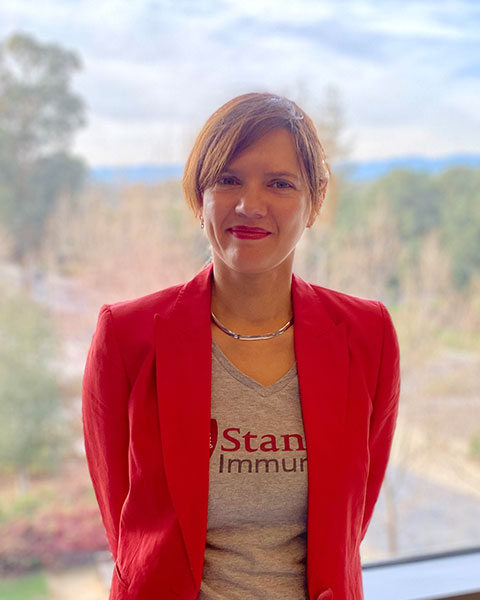Back
Oral
Session: Systems Immunology & AI
Epigenetic Signature and Key Transcriptional Regulators of Human Antigen-inducible Regulatory T Cells
Wednesday, June 19, 2024
1:25 PM – 1:40 PM PT
Location: Salon 8

Alma-Martina Cepika, MD, PhD
Instructor
Stanford University
Stanford, California, United States
Presenting Author(s)
Abstract Text: Regulatory T (Treg) cells are essential to immune tolerance. Classical Tregs arise in the thymus and are skewed to recognize self-antigens, while type 1 Tregs (a.k.a. Tr1 cells) arise from peripheral CD4+ T cells in response to extra-thymic antigens, such as alloantigens or allergens. We can recreate Tr1 cell differentiation in vitro to rapidly make clinical-grade Tr1 products for induction of antigen-specific tolerance. Alloantigen-specific Tr1 cells are already in phase I/Ib clinical trials in allogeneic hematopoietic stem cell transplantation (allo-HSCT), with promising early results. However, the identity of lineage-defining transcription factors (TFs), which regulate the differentiation, phenotype, and functions of human antigen-specific Tr1 cells, remains unresolved. Here, we first demonstrated that human antigen-specific Tr1 cells are clonally and transcriptionally distinct from classical Tregs and conventional CD4+ T cells on a single-cell level. Next, we identified a TF motif signature unique to antigen-specific Tr1 cells, and predicted that IRF4, BATF, and MAF act as Tr1 lineage-determining TFs. The roles of these TFs in regulating various aspects of Tr1 differentiation, function, and phenotype were validated using functional genomics. Finally, we used the Tr1-specific TF signature to identify Tr1 cells in peripheral blood T cells of healthy donors and recipients of allo-HSCT and adoptive Tr1 cell therapy, and in T cells from solid tumors. Identification of the TF signature and key transcriptional regulators of human antigen-specific Tr1 cells will guide the development and optimization of Tr1 cell therapies, identification of human Tr1 cells in vivo, and mechanistic studies of Tr1 cell biology.

